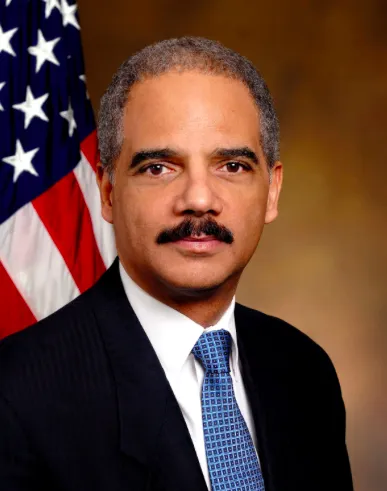Former Attorney General Eric Holder Discusses Democracy and Civil Rights

Eric H. Holder Jr., the 82nd U.S. attorney general, spoke to more than 500 College community members on Thursday night as part of the initial event in a series sponsored by the President’s Fund for Racial Justice and the Social Responsibility Committee of the Board of Managers.
Holder, the first African American in that role, serving from February 2009 to April 2015, discussed a wide range of topics, including the state of the American democracy, civil rights, and voting rights.
“Eric Holder was a natural choice to kick off this series on the challenges of citizenship in a multiracial democracy,” said James Snipes ’75, chair of the Social Responsibility Committee of the Board of Managers. “Throughout his career, as a lawyer, judge and attorney general, he has shown an extraordinary commitment to civil rights, and voting rights in particular. He set the bar high for the programs that will follow.”
The remote event featured a conversation with Holder and Professor of History Allison Dorsey, with questions moderated by Tristan Alston ’22, Sonia Linares ’22, and Daniel Torres Balauro ’23 and an introduction from President Valerie Smith.
“I am hoping our conversation will generate some solutions as to how we move past this particular crisis in democracy,” Dorsey told Holder, who was named to Time magazine’s list of Most Influential People in 2014. Dorsey shared not only her insight and perspective on Black voter suppression history in the U.S. and the Black struggle for freedom and pursuit of equality during Reconstruction and the modern civil rights movement, but also her growing anguish for the well-being of her students, as well as longstanding concern for her two grown sons and grandchildren.
“I want to stress that many of the young people that I know right now … are living in a moment where the revival of violence at the hands of law enforcement has been overwhelming,” Dorsey said.
Holder acknowledged the psychological toll that the events of 2020 and the historic realities of race in America have taken on Black citizens. Despite the past year’s events relating to police abuses, Holder said he remains optimistic that the energy behind the growing social justice movements will continue to inspire change for the better in the country.
“We’ve certainly made progress,” said Holder. “If we deny that we’ve made progress, we don’t recognize the sacrifices that people made, the lives that were given, to make our lives better than they were 100 years ago. There’s no question about that.”
Dorsey responded that, “Historians tend not to talk about "progress" so much as we talk about change over time.” Through her lens as a historian, Dorsey said, “I'm frequently having the sensation that I'm sliding in time.” This sense of sliding in time, she said, relates to her apprehension that “we are moving backward in terms of civil rights, not forward in a progressive fashion."
Holder said he recognized the magnitude of change still urgently needed for equity: “We’re not even close to the place where we need to be as a society.”
In a remarkably candid anecdote, Holder shared that even as the third-longest-serving attorney general in U.S. history, he has had “to talk with my son, as my father had with me, to tell me how you interact with the police. If you get stopped, where you keep your hands …”
Holder urged audience members to increase their engagement in their communities and in government organizations. “Regular, powerful citizens can be involved in the process and have an impact,” said Holder. “We should never underestimate the power we have and young people especially. … The largest voting bloc in this country is young people.”
He referenced several studies showing the bias that exists for voters of color, including a University of Pennsylvania study that revealed non-white voters are seven times more likely than white voters to wait in line for more than an hour to vote.
The discussion explored Holder’s position as chairman of the National Democratic Redistricting Committee and on the role of gerrymandering throughout U.S. history up to the most recent election.
“What I’m looking for is to make sure that we have a process that is fair,” he said.
Gathering together as citizens to demand change and participating in the process is crucial, he said. Dorsey agreed and emphasized that everyone has a stake and needed to be involved.
“There’s no question that 2020 was a moment,” Holder said. “But the question really is going to be, does the moment lead to a movement.”



